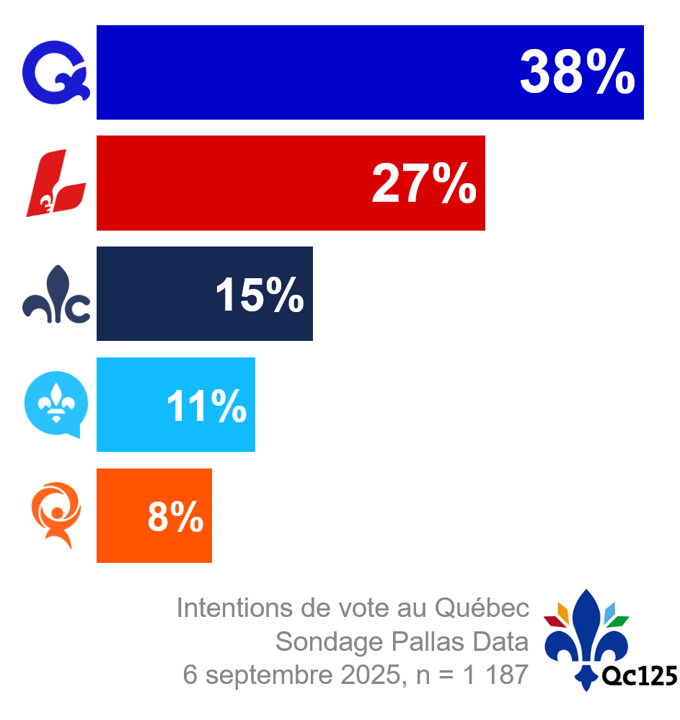Legault’s Historic Slide Continues
What seemed like rock bottom last spring wasn’t: Legault’s CAQ keeps falling, according to a new Quebec poll from Pallas Data.
The parliamentary session in Quebec City may have been prorogued by two weeks, but voters seem to have already passed judgment on the CAQ's summer. A new Quebec poll from Pallas Data poll reveals not only that the Coalition Avenir Québec continues to decline in public opinion (after a five-point drop in the spring), but that this time, the drop is so significant that the CAQ has fallen to fourth place. This is unprecedented.
Conducted on September 6 with a total sample of 1,187 Quebec respondents, the poll has a margin of error of ±3%, 19 times out of 20.
According to Pallas, the CAQ is polling at only 11% among decided voters—a four-point drop since June. This is the worst result ever recorded by any firm for François Legault's party since its creation in 2011.
And, once again, it is the Parti Québécois that is benefiting from the CAQ’s downfall. Paul St-Pierre Plamondon's party has climbed to 38% province-wide, an all-time high for the PQ since the era of Pauline Marois more than ten years ago. This represents a seven-point jump since June. Among Quebec’s francophone majority, the PQ dominates its rivals with 46% support.
If these figures hold until the election scheduled for October 2026, the PQ would form a large majority government at the National Assembly and Paul St-Pierre Plamondon would become Premier of Quebec.
The Quebec Liberals are treading water in this poll, garnering 27% support (+1 compared to June). The good news for the Liberals in this poll? The CAQ's free fall means that the QLP is in second place among French-speaking voters with 17%, 29 points behind the PQ. The bad news? A significant portion of the QLP's support remains concentrated in Montreal, where its potential for gaining seats is limited.
In third place is the Conservative Party of Quebec with 15% support (+1 since June). If Éric Duhaime's troops want to console themselves for their leader's defeat in the Arthabaska by-election, this poll brings them some good news: the PCQ is ahead of the CAQ for the first time in its history.
Québec solidaire takes fifth place with 8% support, a notable decline of four points since June. With such figures, it would not be impossible for the left-wing party to find itself decimated next year.
Regional breakdowns show that the Parti Québécois has a colossal 30-point lead outside the metropolitan areas of Montreal and Quebec City, with 46% support, compared to 16% for the PCQ and 15% for the PLQ.
In Greater Montreal, the Liberals (36%) and the PQ (35%) are locked in a close race. Unsurprisingly, Pallas' figures show a 16-point lead for the PLQ on the Island of Montreal, while the Parti Québécois enjoys an 8-point lead in the Montreal suburbs.
The picture in the Quebec City region seems to have remained unchanged for several months, with the Parti Québécois (35%) in the lead and the PCQ (27%) not far behind. For Éric Duhaime's Conservatives (PCQ), the greater Quebec City region (as well as the Beauce region) offers the PCQ its best chance of entering the red room of the National Assembly next year.
The demographic breakdowns in the poll show how widespread the PQ's lead is—and how deep the CAQ's deficit is. The PQ is in first place among both men and women, among voters aged 18-34, and among older voters (65 and over). Among those under 65, the CAQ is battling with Québec solidaire for fourth place.
Among the French-speaking majority, the PQ has 46% support, 29 points ahead of the Quebec Liberal Party. Next come the PCQ with 14% and the CAQ with 13%.
With a year to go before the start of the election campaign in Quebec, are the numbers set in stone? It's too early to say, but the Parti Québécois' lead is no longer a surprise and seems well established in public opinion. When asked, “Regardless of your political preference, which party do you think will win the next Quebec election?”, 57% of respondents pointed to the PQ, a 15-point increase in support for the PQ since last June's poll.
Nearly a quarter of respondents (23%) believe that the PLQ will return to power next year, while only 8% of respondents chose the CAQ—a five-point drop since the spring.
These figures suggest that a strong majority of Quebecers no longer believe that the CAQ can retain power at the end of its current term. To be continued.
Thank you for supporting 338Canada.
This Pallas Data poll was conducted on September 6, 2025, among a random sample of 1,187 Quebec respondents aged 18 and over. The data was collected by interactive voice response using telephone calls to landlines and cell phones. The poll was commissioned by Qc125. The margin of error on the complete sample is ±3%, 19 times out of 20. You can find the poll report here.



